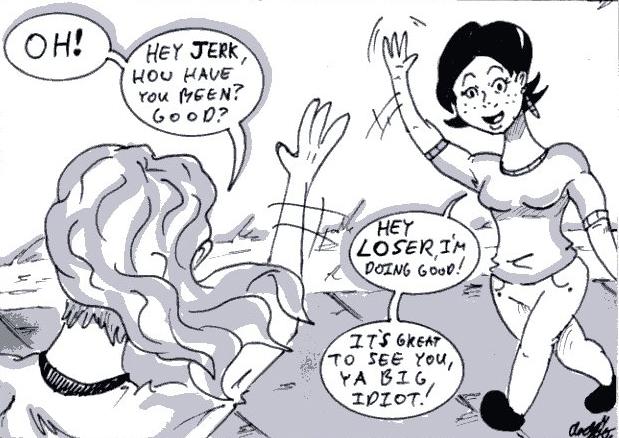Self-degradation is an addiction you need to kick
August 23, 2010
Don’t call me a b***h, unless we’re friends, then it is OK.”
Maybe I am old-fashioned, but I never really understood that dynamic. Written out, this looks just as ridiculous as it sounds, right? So why do you do it?
I think you have a problem.
Think about it. What started out as the bad habit of replacing names with derogatory terms, turned into an addiction to degrading your friends. But of course your friends do not notice (or even mind for that matter) because they are your dealers.
They are constantly supplying your high by accepting whatever you call them. But as soon as someone outside of your circle addresses you in a similar manner, you sober up.
But why get upset at a foreigner to your group for merely mimicking what you and your friends recognize as “appropriate?”
“People within a certain group might not be too accepting of a person outside the group using the word because they could never be considered the target,” said Betty Birner, director of graduate studies for the English department and cognitive science office.
For example, a man would be an improbable target for the word b***h, therefore he should not use it against a woman.
But although there is a clear skew in gender when it comes to this issue, there is also a racial divide when addressing self-degradation.
African Americans call each other the n-word. Considering its history and controversy, why is this OK? Why can we not find another way to express ourselves to one another without using that word? If you’re black, it’s OK. But it’s surely fighting words if you are white.
After the remarks made by former radio personality Dr. Laura Schlessinger and actor/director Mel Gibson, no one can deny this rule is a fact. I cannot even slightly condone Gibson’s actions. I do however, understand what Schlessinger was trying to point out, although her message was coated with distasteful language and ignorance.
The truth is: race is an awkward subject. And trying to give commentary on defining the line between degradation and endearment, when it comes to race, is nearly impossible without being persecuted as a racist.
If you listened to Dr. Schlessinger’s recording of her Aug. 10 broadcast of her radio show, you would hear Schlessinger trying to advise a caller whom is confused and upset by her husband’s friend’s seemingly racist rants.
When the caller asked about how Schlessinger felt about the n-word, Schlessinger said, “I don’t get it. If anyone without enough melanin says it it’s a horrible thing, but when black people say it it’s affectionate.”
But of course she did use the the n-word many times throughout the broadcast as well. Her confusion seemed to be a misconception of the word itself more so than its impact.
“It’s not the word itself, but what’s behind the word,” Birner said. “A word gets power because of its history: the history of pain it’s caused, the history of its intent to hurt people.”
Among other things, by saying n***er instead of n***a, she demonstrated the lack of understanding for African-American culture, consequently making her a racist.
But why should I not feel insulted when another black person calls me that versus when a white person blankly says it?
Moreover, why should I not feel insulted when a friend calls me any deprecating word?
I never was a fan of self-deprecation. But then again, I’m not the one with the problem. Just consider this your intervention.







